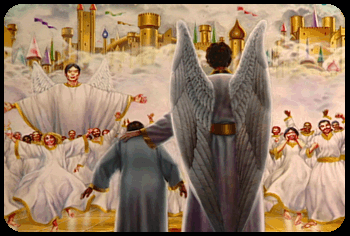“Truly I tell you,
just as you did it to one of the least of these who are members of my family,
you did it to me.”
‘When the Son of Man comes in his glory, and all the angels with him,
then he will sit on the throne of his glory.
All the nations will be gathered before him,
and he will separate people one from another
as a shepherd separates the sheep from the goats,
We are at the judgement.
Jesus sits on a throne in glory, angels around him.
This must will be wonderful sight, one we will all behold, one we will all share in.
Christ the King,
All the nations will be gathered before him,
and he will separate people one from another
as a shepherd separates the sheep from the goats.
It gets a bit trickier there.
This idea of separation.
Sheep and goats.
It all seems quite harsh.
But I suppose the good thing is that in the passage, we are given the criteria of this judgement.
In this passage, Jesus tells what it is that we are to be judged on.
And with the overall message of Matthew’s Gospel,
we are given a lens with which we can focus the message
Jesus says to the those at his right hand, the sheep:
“Come, you that are blessed by my Father,
inherit the kingdom prepared for you from the foundation of the world;
for I was hungry and you gave me food,
I was thirsty and you gave me something to drink,
I was a stranger and you welcomed me,
I was naked and you gave me clothing,
I was sick and you took care of me,
I was in prison and you visited me.”
This list is more or less repeated four times in this passage.
Hungry, thirsty, stranger, naked, sick, imprisoned.
Listen to those.
Hungry, thirsty, stranger, naked, sick, imprisoned.
Think of the kind of people that will suffer them.
These are the people who are having it really tough.
Some may have made bad decisions that have led them to be in such a situation.
But I don’t hear anything in what Jesus says that would allow that to be a reason to not help.
Food, water, welcomed, clothed, care, visited.
Listen to those.
Think of the kind of person that would respond to those in trouble in such a way.
This is a person who responds to need.
Think of the kind of heart that responds in such a way.
This is a heart that is open to another.
This is a heart that is not hardened by life.
This is a heart that is not cynical or suspicious.
This is a heart that responds openly with love.
The actual acts, the actual needs are not the important element.
They are repeated to emphasize the idea of need,
to really bring home the hopelessness of some people’s lives,
but in and of themselves they are not the point.
The main point is what is going on in the person who responds.
It is about showing mercy.
Mercy is a strong feature in Matthew’s Gospel.
In the calling of Matthew,
when Jesus is being criticized for associating with tax collectors and sinners, he replies
Go and learn what this means, “I desire mercy, not sacrifice.”
Again, when he is criticized for doing something unlawful on the Sabbath, he replies
But if you had known what this means,
“I desire mercy and not sacrifice”, you would not have condemned the guiltless.
I desire mercy and not sacrifice
In both instances Jesus is quoting the Prophet Hosea
For I desire steadfast love and not sacrifice,
the knowledge of God rather than burnt-offerings.
Steadfast love, mercy.
This is more important to God than anything else.
To do the works,
to clothe, feed, visit, and care,
but without a heart that is filled with steadfast love,
to do such works as these without a heart that is acting out of mercy
is to miss the point.
It is mercy that God desires from us.
He longs for us to not only look after those who are doing it tough,
but more so to join them in their pain and suffering,
to be one with them, hearts joined, their pain is our pain.
At the outset of his ministry,
Jesus laid out his manifesto of sorts, in which he said:
‘Blessed are the merciful, for they will receive mercy.
He says to those who have shown such mercy
Come, you that are blessed by my Father,
inherit the kingdom prepared for you from the foundation of the world
Mercy, true heartfelt, at one with others mercy will receive mercy from him.
But this goes even deeper that just judgement.
Look who is speaking.
Look at who is being fed, clothed and cared for.
It is Jesus.
“Truly I tell you,
just as you did it to one of the least of these who are members of my family,
you did it to me.”
So, on this feast of Christ the King, when we celebrate the exalted Lord,
we are to remember Christ as one of the least.
And think of Jesus words when questioned about the greatest commandment:
“You shall love the Lord your God with all your heart, and with all your soul, and with all your mind.” This is the greatest and first commandment. And a second is like it: “You shall love your neighbour as yourself.”
With Jesus self identification with the least, our neighbour, this statement becomes deeper.
In loving and serving our neighbour, we are loving and serving Christ.
The two commandments have become one and the same.
‘Blessed are the merciful, for they will receive mercy.
It will be in our showing mercy, that we will receive mercy




